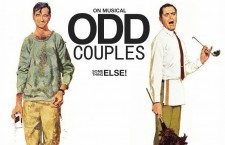It was a new era, not necessarily for Bruce Springsteen but for me. In the relatively short period of time between the release of Human Touch / Lucky Town and then The Ghost of Tom Joad, the clock finally ran out of my marriage. By the time this record had come out, I had found new love and was looking at what seemed like a new life.
In the lead time before Springsteen’s The Ghost of Tom Joad arrived on November 21, 1995, I had warned this new person of my musical obsessions. I would be purchasing the album on the morning of the release, and there would be some intensive listening sessions to follow. But instead of doing what I usually do, which is to buy the album during the work day and then spend the rest of the day at “work” listening to it, I held off and didn’t even open the package until getting home that night. (Yeah, that took some will power.) I introduced her to my listening ritual, which is nothing more than sitting down and reading the liner notes/lyrics as the initial play goes by.
We settle down on the couch and pressed “Play.” That the stories would be bleak was a given. Looking back, I don’t remember what my expectations were for her reaction, or that I was even concerned about them. Was I trying to impress her? No, it was more that I felt the need to be honest about this one thing in my life that was hugely important. Was it a gamble? Maybe.
And “bleak” is the key word for this album. The dust bowl days were indeed dark ones, and the theme of the unfortunate ones is one that is threaded through much of Bruce Springsteen’s work. Because of the sonics involved, people like to speak of this record in the same breath as Nebraska. While there are some similarities, I’ve always seen this as of a piece with his collection of songs that (in his own words, distilled) attempt to describe the distance between the American Dream and the American Reality.
Did my gamble pay off? Well, it didn’t hurt. That “new love” is now known as TheWife™.
“STRAIGHT TIME”: In a dark song that would not have been out of place on Nebraska, our protagonist is finding life difficult in his post-prison years. Bruce tells the story in a series of vignettes — the factory, the crooked uncle, the not quite trusting wife — all of these thing adding to the subtle pressure growing inside. This is some harsh stuff:
Kitchen floor in the evening, tossin’ my little babies high
Mary’s smilin’, but she watches me out of the corner of her eye
Seems you can’t get any more than half free
The sad reality of the prison system is that lives that are already broken in some way tend to be pushed further in that direction. There really is no rehabilitation going on. Or not much. It’s a complex situation not easily remedied, even if we had the will.
The temptation to slip over the line into that former life is a strong one, and Charlie saws off that shotgun and takes that step.
“YOUNGSTOWN”: With its theme of angry economic disappointment, the pairing of “Youngstown” with “Murder Incorporated” has become something of a tradition at E Street Band shows. And, as this video plainly illustrates, the slightly unhinged Nils Lofgren guitar solo is a welcome part of that tradition.
“Youngstown” connects the darkness of the dustbowl with a more modern economic phenomenon: the dismantling of the United States’ steel industry. It’s not exactly a subtle message, but maybe the blunt reality doesn’t deserve such a treatment.
This is exactly the kind of tune (live performances in particular), by the way, that comes to mind when folks bring up the idea that Bruce Springsteen has no business singing about the downtrodden with his level of wealth. Right. If you can’t hear the obvious passion projected in the song, then maybe your prejudices are blocking out something very important.
“DRY LIGHTNING”: When the fans start talking about what’s next on the Springsteen horizon, there’s usually somebody who will bring up the idea of Bruce doing a country album. This is immediately shot down as being the worst idea ever. But … is it?
If we lay down the ground rule that the album won’t be one of these slick Nashville, pop music with a bit of twang (plus big hat) deals, then the idea has a lot of promise. If you take a more roots-oriented song like “Dry Lightning” as an example, you can see the promise. Maybe add a touch of pedal steel and sonically you’ve got some country honesty right there. The story, a reflection on a relationship that just didn’t work out, is again pure country … but without the cliche’.
Bruce Springsteen has always been at home with understated songs that tell a big story. Sure as hell beats most modern “country” songs that seem to be big but have nothing to say. Now, do I want this to happen? Maybe someday. Bruce could pull it off.
“THE NEW TIMER”: I’ve always been a big fan of Jack Kerouac. There’s a lot of bad behavior in those stories, but there’s also a kind of innocent embrace of life’s possibilities. Yes, we’re often forced to make some tough choices, but that can’t diminish the romantic appeal of having no cares, of being able to hop the next freight train just to see what’s happening down the rails.
Except of course, that sort of “freedom” often comes with some mean reality.
Bruce Springsteen’s “The New Timer” adds to the lore of great depression stories. It would be bad enough to have your life destroyed by terrible economic circumstances, but then to be haunted by the loss of a friend, first because you’ve split up and then because you learn that he’s been killed. In a final twist, our man reveals that his own god can’t quiet his mind … that justice at the end of a gun barrel is required.
I’m not a religious man, but it’s not difficult to see the tragedy of this situation. I bet Jack and Neal would have too.
“GALVESTON BAY”: Here’s a powerful bit of storytelling, about the intersection of lives that have seen tragedy and, depending on the decisions they make, might see more. On a direct level, Bruce Springsteen’s “Galveston Bay” is about the collision of interests in the Gulf of Mexico, with refugees coming from Viet Nam being seen as encroaching on local interests. The deeper story is one of struggle and trying to do the “right” thing while making a life.
Conflicts like these seem to have a kind of infinite regression quality. A young country (because honestly, that’s what we are) is started by refugees escaping the demands of an empire. As we’ve grown to be an empire (some would say the empire), we have pockets of conflict with new sets of refugees. How we deal with these situations says a lot about our interests and who we are as a people. Right or wrong, we sometimes make decisions not based on the complexity of the situation, but instead to placate one political group or other.
I don’t have any answers. But sometimes it seems like we forget that everybody, just like Le Bing Son and Billy Sutter, has a family to tend to.
- Why the Rolling Stones’ Harrowing ‘Gimme Shelter’ is Still Revealing New Depths - November 18, 2024
- How Talking Heads’ ‘Fear of Music’ Opened Up a World of Art and Sound - August 5, 2024
- How Deep Cuts Propelled Bruce Springsteen’s ‘Born in the U.S.A.’ - June 4, 2024



